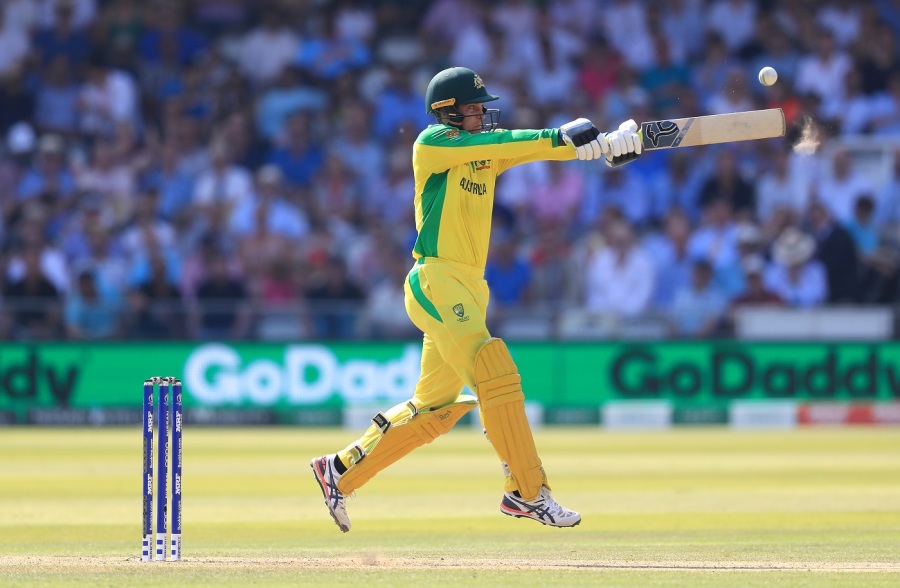
Australia 243 for 9 (Khawaja 88, Carey 71, Boult 4-51) beat New Zealand 157 (Starc 5 for 26) by 86 runs
Big-game temperament, they said. On a decent run of form, with players coming back in who will strengthen them further. Know how to win a World Cup (or five). Plenty of observers warned the real Australia would turn up at this tournament, though fewer predicted they would be the first team to secure a semi-final place. But after brushing aside the early pace-setters in this round-robin format, Australia look increasingly - and menacingly - close to their best once again.
Watch on Hotstar (India only): Highlights of Alex Carey's match-turning innings
New Zealand removed Australia's openers cheaply, chipped away at the middle order and then finished off the innings with a Trent Boult hat-trick - the first in ODIs at Lord's. That Australia managed to make as many as 243 for 9 was largely down to a century partnership between Usman Khawaja and Alex Carey, the latter batting more fluently than anyone else on the day. Mitchell Starc then corralled a record third World Cup five-for, as a relentless, ruthless and (admittedly) slightly hotchpotch attack dismantled New Zealand.
The key wicket, that of Kane Williamson, was claimed by Starc, whose 5 for 26 saw him overtake his tournament-leading tally of 23 wickets from the 2015 World Cup. New Zealand's captain had not previously been dismissed by Starc in ODIs - a record which included their group-stage encounter four years ago, when Williamson thundered the final six that sealed a barnstorming one-wicket win in Auckland. At Lord's, it never got anywhere near so close.
Having recovered from 92 for 5, Khawaja anchoring the innings from the fifth over to the 49th - when he became the first part of Boult's late-swinging yorker tryptich - Australia simply preyed on New Zealand's insecurities with the bat. Williamson's 40 included being dropped twice and Ross Taylor was the only other player to get past 20 as the challenge of going at almost five an over on a tacky pitch proved too much.
WATCH on Hotstar (US only): Full match highlights
Australia captain Aaron Finch was able to cycle through as many as four part-time bowlers, including himself, as his three premier quicks plus the orthodox spin of Nathan Lyon kept New Zealand tied down. Never was the sense greater that momentum was with Australia than when Steven Smith was brought on to bowl an over of legspin and promptly claimed his first ODI wicket in five years, as Colin de Grandhomme picked out long-off.
Finch, Smith, Marcus Stoinis and Glenn Maxwell combined for figures of 9-0-43-1 and that in itself provided a measure of Australia's eventual dominance. None of the big four went at more than 3.60 an over, with Jason Behrendorff backing up his five-star performance against England by removing both New Zealand openers in an opening spell that was extended to nine overs; and Nathan Lyon claimed his maiden World Cup wicket to suggest Australia have found the right balance for the slower surfaces that have predominated in the tournament.
New Zealand were left to ponder another stuttering batting display, which leaves them facing a potentially nervous final group game against England next week. The move to bring in Henry Nicholls for Colin Munro at the top of the order brought only limited success - although an opening stand worth 29 was still New Zealand's third-best of the competition - while despite starting well with the ball, Ish Sodhi's legspin was underused and Williamson resorted to bowling himself for seven overs during the pivotal stand between Khawaja and Carey.
Williamson perhaps reasoned that his offbreaks were more likely to trouble the pair of Australia left-handers - with both Sodhi and Mitchell Santner turning the ball into the batsmen - but it reinforced the nagging sense that New Zealand are overly reliant on their captain.
He did eventually remove Carey, caught at cover looking to press the accelerator in the final Powerplay, though by that time Australia had fought their way back into the contest. Khawaja was largely becalmed, scoring only two boundaries in his first 100 balls, but he proved an adept foil for the more dynamic Carey, who continued his excellent form by scoring more than two-thirds of the runs during their 107-run stand.
On a day highlighted by several brilliant catches - Martin Guptill's to dismiss Smith, James Neesham's off his own bowling to remove Glenn Maxwell, and Smith off Tom Latham all deserved a mention in dispatches - it was a missed chance that may have proved most significant. Khawaja's second ball, driving at Boult, flew hard and low off the outside edge only for Guptill to shell it going one-handed to his right from second slip.
On a roasting day in the capital, Australia had chosen to bat but, for only the second time in the tournament, Finch and David Warner could not provide a significant foundation. Boult rapped Finch on the knee roll and Warner was the first of a brace of short-ball breakthroughs for Lockie Ferguson, with Smith then plucked brilliantly by Guptill after pulling sweetly but within range of short fine leg; but although neither Stoinis nor Maxwell could produce the goods in the middle order - Australia's one area of minor concern - they nevertheless found a way to get away.
The innings juddered to a halt as Boult struck the stumps of Khawaja and Starc, then had Behrendorff lbw to complete the first World Cup hat-trick by a New Zealander. But it was Australia who ended the day emphatically on top.















 Phone: (800) 737. 6040
Phone: (800) 737. 6040 Fax: (800) 825 5558
Fax: (800) 825 5558 Website:
Website:  Email:
Email: 






